|
|
|
Sort Order |
|
|
|
Items / Page
|
|
|
|
|
|
|
| Srl | Item |
| 1 |
ID:
116622
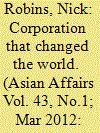

|
|
|
|
|
| Publication |
2012.
|
| Summary/Abstract |
For over 200 years the East India Company was the world's largest corporation. Set up as a merchant trading house in 1600, it became a permanent joint stock company in 1657, the forerunner of the modern multinational. The tension between investment and speculation was reflected in a share price which rose and fell with its fortunes. In the beginning bullion was brought from Britain to pay for Indian goods, which were then shipped to Britain. But in 1766, not long after Clive's victory at the battle of Plassey, the Company acquired the diwani, the right to collect the taxes, in Bengal. A situation of "unrequited trade" was thus established. Suddenly the profits from tax collecting more than covered the cost of trade goods. The dividend, jumped from six per cent in 1766 to 12 per cent in 1769. The shares soared. Then the Company's position in South India was threatened and the share price collapsed. The Company had overwhelming debts, but was judged "too big to fail". It had to be bailed out by the British government, which in return secured the right to nominate representatives to the Bengal Council. Corruption and accountability became increasingly important themes. By the time Warren Hastings was Governor-General the company was purchasing vast quantities of tea from China. What could be sold to China in return? Answer: Indian opium. This trade notoriously led to war with China. But by the end of the Second Opium War, the Indian Mutiny had put paid to the Company's rule over India, though the Company continued a financial existence until 1874.
|
|
|
|
|
|
|
|
|
|
|
|
|
|
|
|
| 2 |
ID:
116626
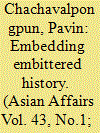

|
|
|
|
|
| Publication |
2012.
|
| Summary/Abstract |
This article draws on the concept of historical overhang, which essentially refers to the way in which negative historical memories both inform and influence public perceptions as well as those of policy makers. It is the manner in which perceptions drawn from historical episodes are interpreted that makes them enduring. The distortion of history and the misuse of nationalism are mainly responsible for the endurance of historical overhangs in Thai-Cambodian relations, particularly when political leaders encountered legitimacy crises at home. The article investigates two major causes of the recent severe deterioration in Thai-Cambodian bilateral ties- the conflict over the disputed Preah Vihear Temple and the clash between the Thaksin-Hun Sen alliance and the Abhisit Vejjajiva government and makes the contrast with the sudden improvement in relations after Abhisit's electoral defeat.
|
|
|
|
|
|
|
|
|
|
|
|
|
|
|
|
| 3 |
ID:
116625
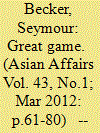

|
|
|
|
|
| Publication |
2012.
|
| Summary/Abstract |
The phrase "The Great Game" was first used in the context of Russia and Central Asia by the ill-fated Captain Conolly in 1840. For Conolly, the game metaphor signified a contest in which the Russians were Britain's potential opponents, while the Central Asians were her immediate ones. Indeed Conolly, like Thorburn, a later writer, seems even to have envisaged Russia as Britain's partner in the work of civilizing Asia. Boulger, tried to use the phrase to signify Anglo-Russian confrontation but interestingly the phrase was little used in the literature on Central Asia until Kipling's "Kim" endowed it with a popularity and the implication of great power rivalry which it had not previously enjoyed. In fact widespread use only came after the Soviet invasion of Afghanistan in 1979, though "The Great Game" is now in ever more frequent use to signify American/Russian rivalry. Kipling's use has triumphed over Conolly's.
|
|
|
|
|
|
|
|
|
|
|
|
|
|
|
|
| 4 |
ID:
116623
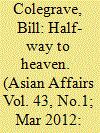

|
|
|
|
|
| Publication |
2012.
|
| Summary/Abstract |
This is an account of a journey in 1990 to try to establish the source of the Oxus, a river which "starts with a bang …and finishes with a whimper." But controversy has raged for years about its exact source. Naval Lt. Wood claimed that the Syr Kul lake was the source and his view held sway for fifty years until Lord Curzon discovered an Ice Cave which he declared was the true source of the Oxus. Colegrave's journey retraced the steps of earlier explorers and adventurers, up the Wakhan valley, into the Pamirs and along the Wajkir river. He located Curzon's Ice Cave but then went on to discover the deep valley of the Chelab river, which he asserts is the true source of the Oxus.
|
|
|
|
|
|
|
|
|
|
|
|
|
|
|
|
| 5 |
ID:
116627


|
|
|
|
|
| Publication |
2012.
|
| Summary/Abstract |
Apparently, in 1953 the World Bank put forward a compromise proposal to break the impasse between Mossadegh and the Anglo-Iranian Oil Company. Mossadegh asked Hassibi, a devout Muslim, to advise him whether he should accept the proposal. Hassibi consulted Abbas Parkhideh, a member of the oil company board, another devout man. As the story goes, the two men decided to resort to Estekhareh, the Persian practice of using the Qor'an to help with a difficult decision. On the basis of the ensuing consultation of the Qor'an, Habibi advised Mossdegh to reject the Bank's proposal. He did so. The coup that overthrew him occurred within a month.
|
|
|
|
|
|
|
|
|
|
|
|
|
|
|
|
| 6 |
ID:
116621
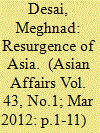

|
|
|
|
|
| Publication |
2012.
|
| Summary/Abstract |
After a period of some 250 years in which Europe has been in the ascendency, the economic pendulum has begun to swing back towards Asia, "back" because until about 1750 it was Asia that dominated the Eurasian land mass with its large cities, sophisticated lifestyles and flourishing trade. Then Europe embraced the modernizations of the Industrial revolution and reaped the benefits. Now a dynamic Asia is modernizing very fast. Is it sustainable? Much depends on whether Asia can resolve peacefully those problems of old-style nationalism which exhausted Europe. Even so, the statistics of recent growth in India and China cannot necessarily be extrapolated into the future; export-led growth is one thing, running global businesses is quite another. There is much talk of corruption in Asia, but this is perhaps a problem to be managed, rather than solved. Asia is not just South Asia (India), East Asia (China) and South East Asia (the "Tiger" economies). Recent events in the Middle East (West Asia) suggest a move towards democracy, which could transform the nature of Asia. And then there is Central Asia, with its huge mineral resources. The Resurgence is proceeding at a different pace in different parts of Asia and the fantastic prospect is of the whole Eurasian land mass prospering at the same time.
|
|
|
|
|
|
|
|
|
|
|
|
|
|
|
|
| 7 |
ID:
116624
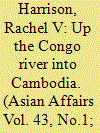

|
|
|
|
|
| Publication |
2012.
|
| Summary/Abstract |
This paper examines the connections between two key Western cultural texts: Joseph Conrad's 1899 novella Heart of Darkness, set in the Belgian Congo; and the Oscar-winning movie Apocalypse Now (dir. Francis Coppola, 1979). The synergies between these two works are viewed through the lens of postcolonial thought, as shaped in particular by the arguments of Edward Said and Chinhua Achebe. The erasure of the native "other" in both novel and film is argued to point to a persistent Western cultural resistance to non-Judeo-Christian, non-Western subjectivities, be they located in Africa, South East Asia or elsewhere. Instead we have a dominant depiction of the native "other" as stereotype (threatening, barbaric, uncivilized), as merged with a dangerous local environment, or as barely present at all.
|
|
|
|
|
|
|
|
|
|
|
|
|
|
|
|
|
|
|
|
|